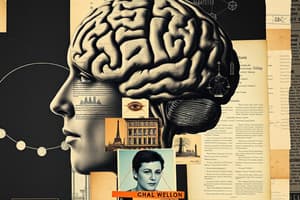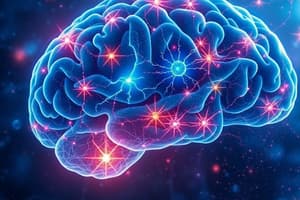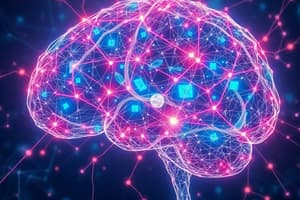Podcast
Questions and Answers
What is the function of the dendrites in a neuron?
What is the function of the dendrites in a neuron?
- Carrying information to other neurons or muscles via synapses
- Receiving signals from other neurons via synapses (correct)
- Containing the neuron's genetic material and metabolic machinery
- Transmitting information to other neurons
Where does the neurotransmitter float across in a synapse?
Where does the neurotransmitter float across in a synapse?
- Soma
- Axon
- Synaptic cleft (correct)
- Dendrites
What is the main function of the axon in a neuron?
What is the main function of the axon in a neuron?
- Releasing neurotransmitters for synaptic transmission
- Containing the neuron's genetic material and metabolic machinery
- Transmitting information to other neurons or muscles via synapses (correct)
- Receiving signals from other neurons via synapses
In which part of the neuron is the genetic material and metabolic machinery contained?
In which part of the neuron is the genetic material and metabolic machinery contained?
What is the primary function of GABA?
What is the primary function of GABA?
Which neurotransmitter is involved in mood regulation, appetite, and sleep?
Which neurotransmitter is involved in mood regulation, appetite, and sleep?
What is neuroplasticity's remarkable capability?
What is neuroplasticity's remarkable capability?
Which area of the brain is responsible for emotional processing and the flight-or-flight response?
Which area of the brain is responsible for emotional processing and the flight-or-flight response?
What is one of the most promising areas of research in neuroscience mentioned in the text?
What is one of the most promising areas of research in neuroscience mentioned in the text?
What is the primary function of norepinephrine?
What is the primary function of norepinephrine?
What is the approximate number of neurons in the human brain?
What is the approximate number of neurons in the human brain?
Which part of the neuron transmits signals to other neurons?
Which part of the neuron transmits signals to other neurons?
What is the function of neurotransmitters in neuron communication?
What is the function of neurotransmitters in neuron communication?
Which part of the neuron contains the nucleus and other structures?
Which part of the neuron contains the nucleus and other structures?
What is the role of the cerebellum in the brain?
What is the role of the cerebellum in the brain?
How does synaptic plasticity contribute to learning and memory?
How does synaptic plasticity contribute to learning and memory?
What has neuroscience revolutionized in medicine?
What has neuroscience revolutionized in medicine?
What is one of the frontiers that neuroscientists are currently exploring?
What is one of the frontiers that neuroscientists are currently exploring?
What function does the cerebrum serve in the brain?
What function does the cerebrum serve in the brain?
What has neuroscience challenged traditional concepts of?
What has neuroscience challenged traditional concepts of?
Flashcards are hidden until you start studying
Study Notes
Title: Unraveling the Mystery: Exploring Neuroscience - From Synapses to Brain Complexity
A Journey into the Enigma of Neuroscience
Neuroscience, a multidisciplinary field that flourishes at the intersection of biology, psychology, chemistry, and physics, aims to decipher the workings of our mysterious brain. This captivating arena of study delves into the intricacies of the nervous system, shedding light on how our thoughts, emotions, and behaviors arise from neuronal activity.
The Astonishing Complexity of Neurons
At the heart of neuroscience lies the neuron, the fundamental building block of our nervous system. Each neuron, or nerve cell, acts as a microscopic communicator with specialized structures for transmitting information. These structures include:
- Dendrites: The neuron's "receiving" apparatus, receiving signals from other neurons via synapses.
- Soma (Cell body): Contains the neuron's genetic material and metabolic machinery.
- Axon: The neuron's "transmitting" arm, carrying information to other neurons or muscles via synapses.
- Synapse: The junction between two neurons, where information is transmitted via neurotransmitters.
The Synapse: The Brain's Communication Hub
The synapse, a minuscule gap between neurons, is where neurotransmitters are released, allowing for transmission of electrical signals. These neurotransmitters are chemical messengers that float across the synaptic cleft, altering the receptivity of the receiving neuron. Over 100 different neurotransmitters exist, each contributing to specific cognitive functions and behaviors.
Neuroplasticity: The Brain's Ability to Change
Neuroplasticity, a phenomenon that highlights the brain's ability to adapt and rewire itself, is an essential concept in neuroscience. This remarkable capability allows the brain to learn, recover, and evolve, despite the aging process. Our experiences, thoughts, and emotions can reshape the brain's neural connections, making neuroplasticity a critical aspect of our intellectual and emotional growth.
The Power of Neurotransmitters
Neurotransmitters, the brain's chemical messengers, play a crucial role in the transmission of nerve signals. They can either excite or inhibit neurons, thus modulating our behaviors, thoughts, and emotions. Among the best-known neurotransmitters are:
- Dopamine: Linked to motivation, reward, and pleasure.
- Serotonin: Involved in mood regulation, appetite, and sleep.
- Norepinephrine: Affects arousal, attention, and alertness.
- GABA: Inhibits neurons, playing a role in anxiety and stress reduction.
The Brain's Complexity: The Networks
The human brain, a complex network of interconnected neurons, is home to a multitude of brain regions, each with unique functions. Some of the most celebrated brain areas include:
- The Hippocampus: Crucial for memory formation and storage.
- The Prefrontal Cortex: Involved in higher-order cognitive functions, such as decision-making and planning.
- The Amygdala: Responsible for emotional processing and the flight-or-flight response.
- The Cerebellum: Involved in motor coordination and balance.
Decoding the Enigma: The Future of Neuroscience
The field of neuroscience is ever-evolving, with new discoveries that are perpetually reshaping our understanding of the brain. Some of the most promising areas of research include:
- Neurotechnology: Devices that can read or modify brain activity, such as brain-computer interfaces and neurostimulation.
- Functional Imaging: Techniques like magnetic resonance imaging (MRI) and positron emission tomography (PET) that allow us to visualize brain activity.
- Genetics: Exploring the relationship between genes and brain function, leading to cutting-edge treatments for neurological and psychiatric disorders.
Final Thoughts
Neuroscience, a field that delves into the intricacies of the brain and nervous system, has captured the imagination of scholars and the general public alike. From the synapse to the interconnected networks of the brain, our knowledge of this vital organ continues to expand, offering hope for a better understanding of ourselves and the world around us.
Studying That Suits You
Use AI to generate personalized quizzes and flashcards to suit your learning preferences.





